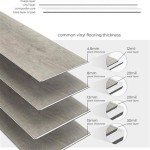The Benefits of Using Floating Vinyl Plank Flooring Underlayment
Floating vinyl plank flooring is becoming increasingly popular due to its durability, ease of installation, and cost-effectiveness. However, using an underlayment beneath your floating vinyl plank flooring is essential to ensure optimal performance and longevity.
An underlayment plays a crucial role in providing support and stability to your flooring, enhancing its comfort and sound insulation. Here are the key benefits of using an underlayment with floating vinyl plank flooring:
1. Enhanced Stability and Support:
Underlayment provides a stable and even surface for your floating vinyl plank flooring to rest on, preventing flexing and bending. It helps distribute weight evenly across the floor, reducing the risk of damage or buckling.
2. Improved Sound Insulation:
An underlayment acts as a sound barrier, absorbing impact noise and reducing the transmission of sound throughout your home. This is particularly beneficial in multi-level homes or apartments.
3. Moisture Protection:
Underlayment helps protect your flooring from moisture damage, especially in areas where spills or humidity may occur. It creates an additional layer between the subfloor and the vinyl planks, preventing moisture from penetrating and damaging the flooring.
4. Thermal Insulation:
Underlayment can provide thermal insulation, helping to retain heat in colder months and keep your home cooler in warmer months. This results in reduced energy costs and a more comfortable living space.
5. Comfort and Cushioning:
An underlayment provides a layer of cushioning, making your flooring more comfortable to walk and stand on. It absorbs impact and reduces fatigue, especially when standing for extended periods.
6. Easier Installation:
Underlayment can make the installation of floating vinyl plank flooring easier. It provides a smooth and level surface, allowing the planks to fit together seamlessly.
7. Extended Floor Life:
Proper underlayment installation contributes to the longevity of your floating vinyl plank flooring. It supports the planks, prevents damage, and protects against moisture, all of which extend the life of your flooring investment.
Choosing the Right Underlayment:
Select an underlayment that is specifically designed for floating vinyl plank flooring. Different types of underlayment vary in thickness, density, and material composition.
Consider the following factors when choosing an underlayment:
- Subfloor Type: Match the underlayment to the type of subfloor you have (e.g., concrete, plywood, etc.).
- Moisture Resistance: Opt for an underlayment with moisture resistance to protect against spills and humidity.
- Sound Insulation: Choose an underlayment with a higher sound insulation rating for better noise reduction.
- Thermal Insulation: Consider an underlayment with thermal insulation properties for improved comfort and energy efficiency.
- Thickness: Select an underlayment that is appropriate for the thickness of your vinyl plank flooring.
By investing in a quality underlayment, you can maximize the benefits of floating vinyl plank flooring, ensuring a comfortable, durable, and long-lasting floor covering for your home.

Do You Need Underlayment For Vinyl Plank Flooring

Underlayment For Vinyl Flooring Best Options Home Pros

Underlayment For Vinyl Flooring The Only Guide You Need Floor City

Do You Need An Underlayment For Vinyl Plank Flooring

Underlayment Buyer S Guide

Types Of Laminate Flooring Underlay Which To Choose

Do You Need An Underlayment For Vinyl Plank Flooring

Quietwalk 100 Sq Ft X 3 33 34 1 4mm Acoustical Underlayment With Vapor Barrier For All Vinyl Plank Flooring Qwlv100 The Home

Do I Need Flooring Underlayment How To Decide Which Jona Panel S Inc

Do You Need Underlayment For Vinyl Plank Flooring
See Also







